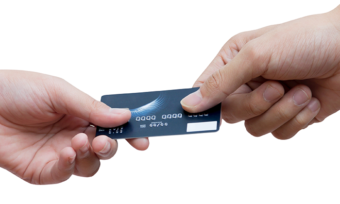We all have that fancy friend who travels in business class and loves to share every bit of the experience on Instagram. You know the drill – I’m talking about the friend who starts posting on their stories the minute they board a flight, showing off the big comfy seats, the extra legroom, the in-flight entertainment setup, and the rest. As a kicker, they’ll probably also share a photo of them holding a glass of bubbles, toasting the fabulous vacation upon which they’re about to embark.
That person is the worst, but you’ve gotta admit, the experience does look like fun. If you’ve ever wanted to be that annoying friend flying business class, then an upgrade could actually be closer than you think, and credit card reward points (used responsibly) could potentially help you get there. Choosing the right Instagram caption is up to you, but here are some credit card tips that can help score you that upgrade.
1. Look for the right credit card
While it may seem obvious, one of the first steps is comparing credit cards and finding one that suits you.
Look for a credit card with a high earn rate (the number of points earned per dollar spent) while factoring in any conditions or points caps that may apply.
It’s also important to consider the card’s annual fee, as well as the purchase rate if you aren’t able to pay off your balance each month.
Compare credit cards with Canstar
Compare Credit Cards with Canstar
If you’re currently comparing credit cards, the comparison table below displays some of the rewards credit cards currently available on Canstar’s database for Kiwis looking to spend around $2000 per month (some may have links to providers’ websites). The products are sorted by Star Rating (highest to lowest), followed by provider name (alphabetical). Use Canstar’s credit card comparison selector to view a wider range of credit cards. Canstar may earn a fee for referrals.
2. Consider sign-up bonuses
Many providers offer large sign-up bonus points for new credit cards.
Be sure to check if any conditions apply – for example, some providers will require you to spend a certain amount of money within a set time period to get the extra points. Also be careful to not sign up for a credit card based purely on the sign-up offer. Consider the overall impact of a credit card on your finances before applying, taking into account factors such as its interest rate and annual fee, and whether a credit card is appropriate for your situation more generally.
As a general rule, it’s best to avoid applying for lots of credit cards to get sign-up points. This will be recorded on your credit record and could have a negative impact on your credit score, which may make it more difficult to get credit in the future.
→Related article: How to Check Your Credit Score And Why You Should
3. Could you use your card for some everyday expenses?
Consider using your credit card to pay for everyday or recurring expenses such as groceries, petrol, electricity, internet and phone bills. However, if you do this, make sure you can pay off your balance in full each month. If you only make the minimum repayment on your credit card each month, you could be charged a large amount of interest on these expenses and interest could continue to build up over time.
Remember, only ‘eligible’ purchases will earn you points. For example, generally, you can’t earn points on cash advances, interest payments, banking fees and charges or gambling. Check the T&Cs with your credit card provider, and read the card’s Product Disclosure Statement (PDS).
4. Shop at partner retailers
Frequent flyer programs, such as Airpoints, allow you to earn points by shopping with partner retailers or using partner services. If you use your credit card to pay, this could boost your points balance even more.
For example, you can earn Airpoints at a host of partner retailers such as Mitre 10, New World, Z, Spark and more.
5. Pool points with family members or your partner
You may be able to enlist a family member’s help with building your points balance. An example of this is the Shairpoints scheme from Airpoints.
Pooling them this way could help you to build enough points to take advantage of a reward you both would like. However, there may be a cap on the number of points you can transfer each year.
You could also consider getting a joint credit card with a family member or partner or adding them as an additional cardholder on your credit card. Remember that as the primary cardholder, you will be responsible for the additional card and need to pay for transactions made. You may also need to pay an annual fee for each additional cardholder.
6. Factor in any ‘free’ extras
It may be worth finding a card with additional perks or bonuses to help offset some or all of your annual fee. An example would be cards that may have an annual fee of around $200, but provide you with an annual free return domestic flight or a travel credit. This can be beneficial if you travel regularly.
7. Consider other points-earning products
Although it’s not a credit card hack per se, another way of earning points is to take out other financial products that offer frequent flyer points.
For example, some insurance products offer Airpoints, while Bayleys offers Airpoints when you sell or manage your property with them.
Of course, you shouldn’t decide to take out or switch financial products based on earning frequent flyer points alone. It’s more important to consider the price and features of each product and whether it will suit your circumstances and needs. Canstar’s Star Ratings may help you to determine if a product represents good value overall.
Compare real estate agents with Canstar
8. Spend your points wisely
When it comes time to redeem your hard-earned points, make sure you get the best value out of them.
For example, when you do decide to book your flight, get in early. The good quality reward seat redemptions can fill up quickly.
What to watch out for in a frequent flyer credit card
The most important thing to remember when taking out any sort of credit card, including a frequent flyer card, is that you will need to manage it responsibly to avoid incurring significant expenses. When you spend on a credit card, you will need to pay off the balance owing each statement period, or you will be charged interest, and for rewards cards such as frequent flyer cards, interest can be significant. Likewise, rewards cards tend to come with higher annual fees than other kinds of credit cards.
It is also important to keep in mind that, while perks such as rewards points to spend on frequent flyer miles can be tempting, it is not advisable to spend beyond your means on a credit card just to gain access to these perks. If you are confident in your ability to manage a credit card and pay your balance off each statement period to avoid being charged interest, the perks can be a nice added bonus. You should only consider taking out a credit card, though, if you are confident in your ability to use it responsibly.
Compare credit cards with Canstar
About the reviewer of this page
This report was reviewed by Canstar Content Producer, Caitlin Bingham. Caitlin is an experienced writer whose passion for creativity led her to study communication and journalism. She began her career freelancing as a Search Engine Optimiser, before joining the Canstar team.
Enjoy reading this article?
You can like us on Facebook and get social, or sign up to receive more news like this straight to your inbox.
By subscribing you agree to the Canstar Privacy Policy




Share this article